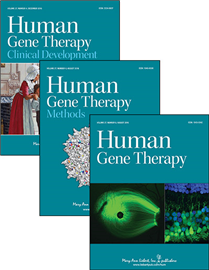For Immediate Release
Debate Continues Over Human Immune System's Role in Blocking Therapeutic Genes Delivered Using AAV Vectors
Contact: Kathryn Ryan
914-740-2250
kryan@liebertpub.com

New Rochelle, NY, April 4, 2017—The hypothesis that memory T cells formed in response to childhood infections may be to blame for the loss of expression of therapeutic genes delivered via viral vectors has been hotly debated, but recent clinical trials of adeno-associated viral (AAV) vector-based gene therapies designed specifically to avoid T-cell responses to AAV have shown the ability to correct debilitating diseases such as hemophilia in some patients. The scientists who proposed this hypothesis discuss the ongoing controversy and progress in developing approaches to overcome AAV-vector-induced T cell responses in an article in Human Gene Therapy, a peer-reviewed journal from Mary Ann Liebert, Inc., publishers. The article is available free on the Human Gene Therapy website until May 4, 2017.
Hildegund Ertl, Wistar Institute and Katherine High, Spark Therapeutics, Philadelphia, PA, are coauthors of the article entitled "Impact of AAV Capsid-Specific T-Cell Responses on Design and Outcome of Clinical Gene Transfer Trials with Recombinant Adeno-Associated Viral Vectors: An Evolving Controversy." They describe the evidence that first led them to look more closely at how T cell responses could interfere in successful therapeutic gene delivery using AAV vectors and why their hypothesis was initially met with much skepticism. The researchers also discuss some of the strategies developed that have shown that it is possible to avoid a T-cell response. These include immunosuppression, use of rare AAV serotypes that the immune system would not typically have previous exposure to, or modified versions of AAV vectors that can deliver and achieve expression of sufficient levels of the therapeutic gene without eliciting an immune response.
“Understanding immune responses to AAV vectors will be the key to fully and safely exploiting their therapeutic potential for diseases like hemophilia,” says Editor-in-Chief Terence R. Flotte, MD, Celia and Isaac Haidak Professor of Medical Education and Dean, Provost, and Executive Deputy Chancellor, University of Massachusetts Medical School, Worcester, MA.
About the Journal
Human Gene Therapy, the Official Journal of the European Society of Gene and Cell Therapy, British Society for Gene and Cell Therapy, French Society of Cell and Gene Therapy, German Society of Gene Therapy, and five other gene therapy societies, is an authoritative peer-reviewed journal published monthly in print and online. Led by Editor-in-Chief Terence R. Flotte, MD, Celia and Isaac Haidak Professor of Medical Education and Dean, Provost, and Executive Deputy Chancellor, University of Massachusetts Medical School, Human Gene Therapy presents reports on the transfer and expression of genes in mammals, including humans. Related topics include improvements in vector development, delivery systems, and animal models, particularly in the areas of cancer, heart disease, viral disease, genetic disease, and neurological disease, as well as ethical, legal, and regulatory issues related to the gene transfer in humans. Its companion journals, Human Gene Therapy Methods, published bimonthly, focuses on the application of gene therapy to product testing and development, and Human Gene Therapy Clinical Development, published quarterly, features data relevant to the regulatory review and commercial development of cell and gene therapy products. Tables of contents for all three publications and a free sample issue may be viewed on the Human Gene Therapy website.
About the Publisher
Mary Ann Liebert, Inc., publishers is a privately held, fully integrated media company known for establishing authoritative peer-reviewed journals in many promising areas of science and biomedical research, including Nucleic Acid Therapeutics, Tissue Engineering, Stem Cells and Development, and Cellular Reprogramming. Its biotechnology trade magazine, GEN (Genetic Engineering & Biotechnology News), was the first in its field and is today the industry’s most widely read publication worldwide. A complete list of the firm’s 80 journals, books, and newsmagazines is available on the Mary Ann Liebert, Inc., publishers website.
Mary Ann Liebert, Inc. 140 Huguenot St., New Rochelle, NY 10801-5215 www.liebertpub.com
Phone: (914) 740-2100 (800) M-LIEBERT Fax: (914) 740-2101